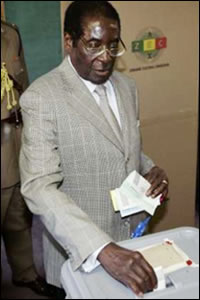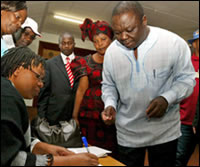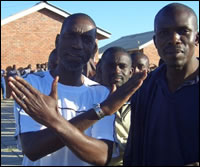Zimbabwe Elections: Tsvangirai and Mugabe Dig Own Grave

 |
| Mugabe casts his vote |
This bold statement not only flies directly in the face of head of the SADC [Southern African Community] Election Observer Team [SEOT], but also adds to the chorus of protests from most Civic Sector Organisations who have condemned the just ended plebiscite as another expensive way of dignifying outgoing president [or incoming?] Robert Mugabe's illegitimate hold onto power.
Mugabe has played his deception role with amazing mastery, hood-winking both SEOT and the gullible Thabo Mbeki into believing the election process was within the SADC norms, but the DA and the African Parliamentary Union observers have refused to buy the front row seats in this gigantic comedy of errors. During his campaign, Mugabe repeatedly claimed that South Africa, Australia and England are beneficiaries of Zimbabwe's high quality education by virtue of 'stealing' Zimbabwean teachers, doctors, nurses and engineers. Zimbabwe, he bellowed, boasts one of the highest literacy rates in the world (yet Zimbabwe Election Commission [ZEC] officers are 'failing' to count votes from a mere two hundred ten constituencies and eight thousand polling stations, figures that were already public information by 30 March!)
Zimbabwe's electoral system is so discredited that no amount of demagoguery by SEOT can sanctify the predictable outcome. However, for presidential hopeful Morgan Tsvangirayi of MDC, he was his own enemy. Mugabe was aware all along that given Zimbabwe's disabled economy, popular resentment was mounting against him. Despite exhausting all the leaves in his national cheque books to buy votes, he knew he would have the last laugh in Tsvangirayi's self-centred egotistical intransigence.
 |
| Tsvangirayi at a polling station |
Out of the five million so-called registered voters, an average of thirty-five percent turned out to polling stations, even in urban centres where MDC traditionally holds sway. Tsvangirayi's urban supporters abstained mainly because they were complacent and read too much into the large crowds he was attracting at rallies. Moreover, his political message was withered, because he devoted most of his valuable time in deriding Dr Makoni and Professor Mutambara instead of amplifying his fundamental difference from Mugabe's ZANUpf. Tsvangirayi's MDC was also embroiled in bitter in-fighting that saw the 'expulsion' of party leaders in the Midlands region, while he himself was accused of fanning division in the party's women wing by bulldozing into the women's council Theresa Makone - his advisor's wife - over Lucia Matibenga, a longtime confidante and former trade union colleague. When it came to selecting candidates, accusations of favouritism, nepotism and infidelity flew from all directions at Tsvangirayi.
In the 2005 plebiscite, Mugabe constricted urban voting by placing few polling stations to wear out opposition supporters, but this time, he flooded cities with polling places so that even by mid-day, everyone who mattered had cast their votes. In fact, at some polling centres like Alexandra Primary School in Harare's posh Belgravia suburb, there were more polling officers than voters! To make matters worse, most polling stations each turned away an average of one hundred voters nationally for many reasons, one of which was their names, although appearing elsewhere in the Voters Roll, were not at that particular voting centre. Mugabe's Delimitation Commission had swapped and altered constituency boundaries to confuse people. While ZANUpf was busy educating its faithful about this 'anomaly', Tsvangirayi concentrated on regional politicking. Since the new electoral law demands that a presidential candidate wins by a clear fifty one percent margin to avoid a deadly run off, Mugabe's rigging system is on full alert to employ sophisticated mathematical engineering to avoid this hurdle. He tried to sneak ballot papers into the system - including postal votes, ghost polling stations and military votes - but Tsvangirayi's election agents and independent observers picked the anomaly.
 |
| The author (left) at a polling station at 6AM |
